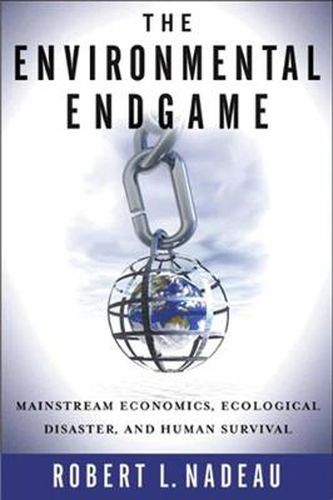Readings Newsletter
Become a Readings Member to make your shopping experience even easier.
Sign in or sign up for free!
You’re not far away from qualifying for FREE standard shipping within Australia
You’ve qualified for FREE standard shipping within Australia
The cart is loading…






For decades, scholars have warned of an impending global environmental crisis. Yet, politicians, particularly in the United States, have consistently shown through their actions towards crucial
green
policies that they are not taking the threat seriously. Initiatives aimed at protecting the planet are commonly seen as belonging to a category unto themselves - the preserve of scientists and environmental enthusiasts. In this groundbreaking book, Robert L. Nadeau warns that we have moved menacingly close to a global environmental catastrophe and that the first step in evading large-scale ecological disaster is to stop drawing a distinction between issues that are
environmental
or
scientific
and those that reside in the sphere of
real life.
Although scientists have attempted to bring ecological concerns to the forefront of the conversation on global issues, Nadeau argues that problems are rarely communicated in ways that can be readily understood by those outside the scientific community. By bringing together perspectives from a variety of disciplines, including economics, politics, biology, and the history of science,
The Environmental Endgame
makes a bold and original effort to articulate the concerns of scientists, in such a way that they become the real-life, tangible concerns of billions of people around the world. Starting from the premise that people require stories to explain their world, how they fit in it, and their relationship and responsibility to different groups, Nadeau asserts that we have entered a new phase of human history and the story that accompanies it cannot be one of separation and division. Instead, it must be one of coherence and mutual goals. Nadeau demonstrates that our current governmental and financial institutions, based on neoclassical economics, lack the mechanisms for positing and implementing viable solutions to large-scale crises. In other words, we should not be thinking in terms of competing nation-states, but should reconfigure international government as a supranational federal system. The book concludes with a call to view the natural world as a part of, not separate from, humanity. This unifying worldview would be a catalyst for implementing the new sorts of international government organizations necessary to resolving the current crisis.
The Environmental Endgame
is an ambitious and timely book that will change the way we think about our economy, our government, and the environment. It should be read by everyone who cares about the pervasive neglect and abuse of planet Earth and what can be done about it.
$9.00 standard shipping within Australia
FREE standard shipping within Australia for orders over $100.00
Express & International shipping calculated at checkout
For decades, scholars have warned of an impending global environmental crisis. Yet, politicians, particularly in the United States, have consistently shown through their actions towards crucial
green
policies that they are not taking the threat seriously. Initiatives aimed at protecting the planet are commonly seen as belonging to a category unto themselves - the preserve of scientists and environmental enthusiasts. In this groundbreaking book, Robert L. Nadeau warns that we have moved menacingly close to a global environmental catastrophe and that the first step in evading large-scale ecological disaster is to stop drawing a distinction between issues that are
environmental
or
scientific
and those that reside in the sphere of
real life.
Although scientists have attempted to bring ecological concerns to the forefront of the conversation on global issues, Nadeau argues that problems are rarely communicated in ways that can be readily understood by those outside the scientific community. By bringing together perspectives from a variety of disciplines, including economics, politics, biology, and the history of science,
The Environmental Endgame
makes a bold and original effort to articulate the concerns of scientists, in such a way that they become the real-life, tangible concerns of billions of people around the world. Starting from the premise that people require stories to explain their world, how they fit in it, and their relationship and responsibility to different groups, Nadeau asserts that we have entered a new phase of human history and the story that accompanies it cannot be one of separation and division. Instead, it must be one of coherence and mutual goals. Nadeau demonstrates that our current governmental and financial institutions, based on neoclassical economics, lack the mechanisms for positing and implementing viable solutions to large-scale crises. In other words, we should not be thinking in terms of competing nation-states, but should reconfigure international government as a supranational federal system. The book concludes with a call to view the natural world as a part of, not separate from, humanity. This unifying worldview would be a catalyst for implementing the new sorts of international government organizations necessary to resolving the current crisis.
The Environmental Endgame
is an ambitious and timely book that will change the way we think about our economy, our government, and the environment. It should be read by everyone who cares about the pervasive neglect and abuse of planet Earth and what can be done about it.